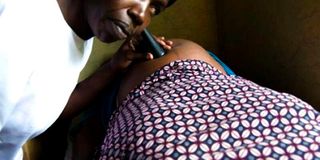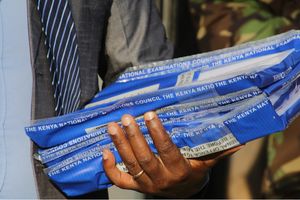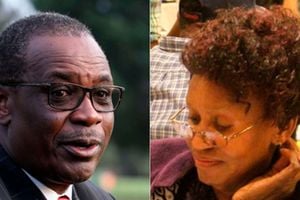'This is our fight' – Kenyan healthcare providers brace for Trump presidency

A pregnant woman undergoing medical check. Healthcare providers have warned of dire consequences for reproductive health services across the country following Donald Trump win.
What you need to know:
- Donald Trump's administration is expected to reinstate and expand the Mexico City Policy that prohibits US-funded organisations from providing abortion services or counselling.
- Some organisations have already begun cancelling reproductive health programs and scrambling to lock in final US funding contracts.
- Others are strengthening security measures against anticipated protests and intimidation from emboldened anti-abortion groups.
Months before the US election, Kenyan reproductive healthcare providers and community organisations had begun preparing for the worst.
Some were scrambling to lock in new contracts for the US aid money they rely on to provide essential health services to Kenyan women ahead of November 5, others to wrap up programs that they knew would have to end in the event of a Donald Trump presidency.
When the US election results were clear, they confirmed the worst fears of Nelly Munyasia, executive director of Reproductive Health Network Kenya (RHNK), a coalition of health professionals.
“We’ll start seeing girls coming in with ruptured uteruses,” she said. “We’ll start seeing lives being lost.”
That’s because President-elect Donald Trump is expected to reinstate the Mexico City Policy, which prohibits foreign organisations that receive US aid from performing, advocating for, or providing counselling or referrals on abortion, even with non-US money.
Every Republican president since the 80s has reintroduced the policy, dubbed the ‘global gag rule’ by opponents. In his first term, Trump expanded its scope with devastating effects for millions of women and girls globally.
Although health advocates across Kenya are better prepared this time, funding cuts are unavoidable, said Munyasia, and will once again deprive some of the world’s poorest women and girls of vital healthcare.
Reproductive healthcare
Organisations that managed to lock in US funding before the election won’t be affected, said Ken Juma, researcher at the Africa Population and Health Research Centre, a Nairobi-based think tank. In light of this, Kenyan NGOs and community-based organisations have been trying to renew contracts before any changes.
“For those who were unable to renew these contracts on time, they have to abandon any programs involving abortion or reproductive healthcare, as the incoming administration will no longer fund them,” he explained.
Some have already stopped providing such services. One organisation that asked not to be named told The Fuller Project they cancelled a reproductive health program earlier this year in anticipation of a Trump win and had also stopped funding other health providers that did not comply with the stringent requirements of the Mexico City Policy.
Kenyan organisations may have little influence over America’s changing abortion policies, but they’re putting the lessons learnt during his first term into action.
Some have been strategic, seeking funding from outside America. That only a few organisations have been able to do this, according to Juma, is not surprising. With the US providing the majority of Kenya’s funding for reproductive health programs, the East African country is often at the whim of who is in power in Washington.
Kenya permits abortion in only a handful of circumstances, including if the life or health of the mother is in danger. Despite this, more than half a million Kenyan women have abortions every year. With few legal options, many resort to desperate measures, such as using knitting needles to terminate their pregnancies. Aborted foetuses floating down Nairobi River have become an all too common occurrence.
Unsafe abortions
Experts say Trump will go even further to undermine sexual and reproductive health and rights globally in his second term, and Juma expects to see increased maternal deaths, a rise in unsafe abortions and more cases of early pregnancy.
The global gag rule is just one concern. Project 2025, the conservative blueprint for the next Republican president, proposes expanding the policy further than ever before by applying it to all US foreign assistance, including humanitarian aid.
“We’re seeing it as a global gag rule on steroids,” says Caitlin Horrigan, senior director of global advocacy for the Planned Parenthood Action Fund.
It also proposes once again eliminating the US’s contribution to the UN agency that provides sexual and reproductive health services in some of the world’s most fragile countries, as well as expanding the Trump-Pence administration’s Geneva Consensus Declaration on Women’s Health and Protection of the Family, an ‘anti-rights’ document that encourages governments to improve women’s healthcare without abortion.
Although President Joe Biden withdrew the US from the non-binding declaration, Trump has pledged to re-join the coalition, which now includes 39 countries (including Kenya and 14 other African countries).
Under Trump’s first administration, Kenya’s anti-abortion movement became particularly pronounced, said Munyasia from RHNK. A second term will give them “lots of muscles”, she added.
Kenyan advocates also cite the US Supreme Court’s overturning of the constitutional right to an abortion, concerned about ripple effects with an emboldened anti-rights movement.
Right-wing Christian groups that oppose sexual and reproductive rights increased their spending by 50 per cent between 2019 and 2022 across Africa, according to research by the non-profit Institute for Journalism and Social Change. Many of these have close ties to Trump and his team, while several are on Project 2025’s advisory board.
Last time Trump was in power, one of the reproductive health providers in Munyasia’s network was targeted by CitizenGo, an ultra-conservative Spain-based advocacy group. Protesters stood outside with placards, calling for the facility to be closed down.
Several years later, they – and the wider reproductive health community – are better prepared, training staff and putting security mechanisms in place.
“We know for sure they will be targeted [again]…there will be intimidation and all that,” said Munyasia. “But the providers know what they need to do.”
Protecting access to abortion services, as guaranteed under the country’s constitution, remains a priority, said Evelyne Opondo, Africa regional director for the International Centre for Research on Women. Standing by the Maputo Protocol, Africa’s home-grown treaty that guarantees strong rights and protections for women, will also be key.
“We’re prepared to fight tooth and nail to defend the progress we’ve made,” she said. “This is our fight, and we’ll continue to fiercely protect and promote the rights of African women.”
This story is published in partnership with The Fuller Project





